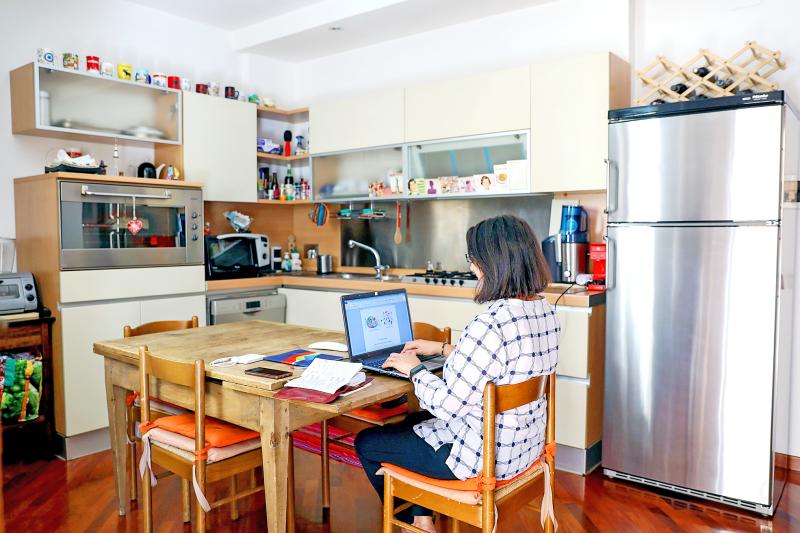People working from home during lockdown spend more time at their jobs and are less likely to be promoted or take time off sick, but are paid above average wages, according to an official study in the UK.
Documenting the shift to remote work during the pandemic, the Office for National Statistics (ONS) said the number of people who did some work at home in 2020 rose by 9.4 percentage points from a year earlier to 35.9 percent of the workforce — representing more than 11 million employees.
However, there were substantial variations between occupations and parts of the country, reflecting the differing experiences of the pandemic for workers as some were hit harder by the crisis than others.

Photo: Bloomberg 照片:彭博社
Although suggesting that the majority of people continued to travel to work during the pandemic, the figures reveal a divergent impact on home workers. According to the research, those using office studies, converted bedroom workplaces and kitchen tables did two-thirds more unpaid overtime in 2020 and were more likely to work after 6pm.
However, they were generally higher qualified and better paid, took longer and more frequent breaks, and started work later in the day.
Staff based at home took less than half the amount of sick leave, with two days compared with four for other employees, reflecting the reduced risk of catching an infection. The ONS said people might also feel well enough to work from home while sick if they did not have to travel.
However, while there is no daily commute and apparent greater flexibility, the research found that those who work consistently from home are less likely to be promoted, in a sign that they could be overlooked due to reduced face-to-face interaction with colleagues and managers.
The study comes as companies across advanced economies adapt to new ways of working, accelerated by the pandemic and facilitated by technological advances, Zoom and video conferencing, and consider making more permanent changes to where staff are based after lockdown.
(The Guardian)
英國一項官方研究顯示,封城期間在家上班的人花在工作上的時間更多,而獲晉升或請病假的可能性較小,但他們的薪水高於平均工資。
英國國家統計局記錄了疫情期間轉為遠距工作的情況,並表示,二○二○年在家做部份工作的人數,佔勞動力的百分之三十五點九,比前一年增加了九點四個百分點,亦即逾一千一百萬名員工。
但是,此情況因職業及國內各區域之不同而有很大的差異,反映出勞工在疫情中的不同經歷,因為有的人在此危機中所受到的衝擊更大。
儘管這些數據表示多數人在疫情期間仍繼續通勤上班,但它顯示居家辦公者所受到的影響不同。根據此研究,那些平常在辦公室上班,而將臥室及餐桌轉為辦公空間的人,在二○二○年的無薪加班時間增加了三分之二,且晚上六點後仍在工作的可能性更高。
但是,他們通常學經歷較高,薪水也較高,休息時間更長、更頻繁,每天開始工作的時間較晚。
在家工作的員工請病假的時間不到一半,只有兩天,而其他員工則為四天,反映出在家工作降低了感染疾病的風險。英國國家統計局表示,員工生病的時候,若不必出門去上班,待在家也可能會覺得舒服一點,身體狀況足以勝任工作。
在家工作雖然不用每日通勤,且更有彈性,但研究發現,一直在家工作的人很少獲得晉升,表示員工與上司面對面的互動減少後,可能會被忽視。
此研究之進行,正值經濟發達國家之企業尋求適應新的工作方式之際。這種轉變因疫情而加速進行,並有科技進展、視訊軟體Zoom及視訊會議等為助力。這些企業考慮在封城結束後,對員工的上班地點做更永久性的變更。
(台北時報林俐凱編譯)

A: Hey, the world’s major dictionaries just unveiled their words of the year for 2025. B: Yup, the Cambridge Dictionary chose the word “parasocial,” which refers to a connection that someone feels between themselves and a famous person they don’t really know. A: One-sided parasocial relationships with celebrities, influencers and even AI chatbots have clearly become more common. B: The Oxford Dictionary picked “rage bait” — online content designed to elicit anger by being frustrating, provocative or offensive in order to increase traffic to Web sites or social media accounts. A: The Collins Dictionary picked “vibe coding.” Let’s

A: Apart from the world’s major dictionaries, the online Dictionary.com actually picked “67” as its word of the year. B: What does “67” even mean? A: Even the dictionary wasn’t exactly sure about its meaning. The slang term’s origin might be traced to US rapper Skrilla’s song Doot Doot (67). Aren’t Taiwanese media outlets choosing the Mandarin word for 2025? B: Yeah and after hearing the song Good-for-Nothing, adapted from some catchphrases of Legislator Wang Shih-chien, I’m going to vote for the character “tsung” (hasty) from the lyrics. A: Hopefully, in the new year, we’ll be calm as the

Sea star wasting disease (SSWD) is a strange and serious illness affecting sea stars, or starfish. This disease causes sea stars to develop painful lesions, lose their arms, and eventually turn into a gooey, melted mess. Since it was first observed in 2013, millions of sea stars along the Pacific coast of North America have died from this __1__. Although viruses were once considered a possible cause, researchers now believe that environmental stressors and microorganisms are primarily __2__ for sea star wasting disease. One of the main environmental triggers appears to be warmer ocean water. When the water heats

Continued from yesterday(延續自昨日) https://www.taipeitimes.com/News/lang The loss of sea stars significantly impacts the ocean ecosystem. Sea stars are important __6__ that help control populations of mussels and sea urchins. Among them, the sunflower star is one of the largest and fastest sea stars and is adept at preying on sea urchins. Without sea stars, sea urchins can __7__ in numbers and devastate kelp forests. These forests are essential __8__ for many marine animals and also help capture carbon from the atmosphere, which is vital in the fight against climate change. The mystery behind SSWD is still __9__, but it is clear that